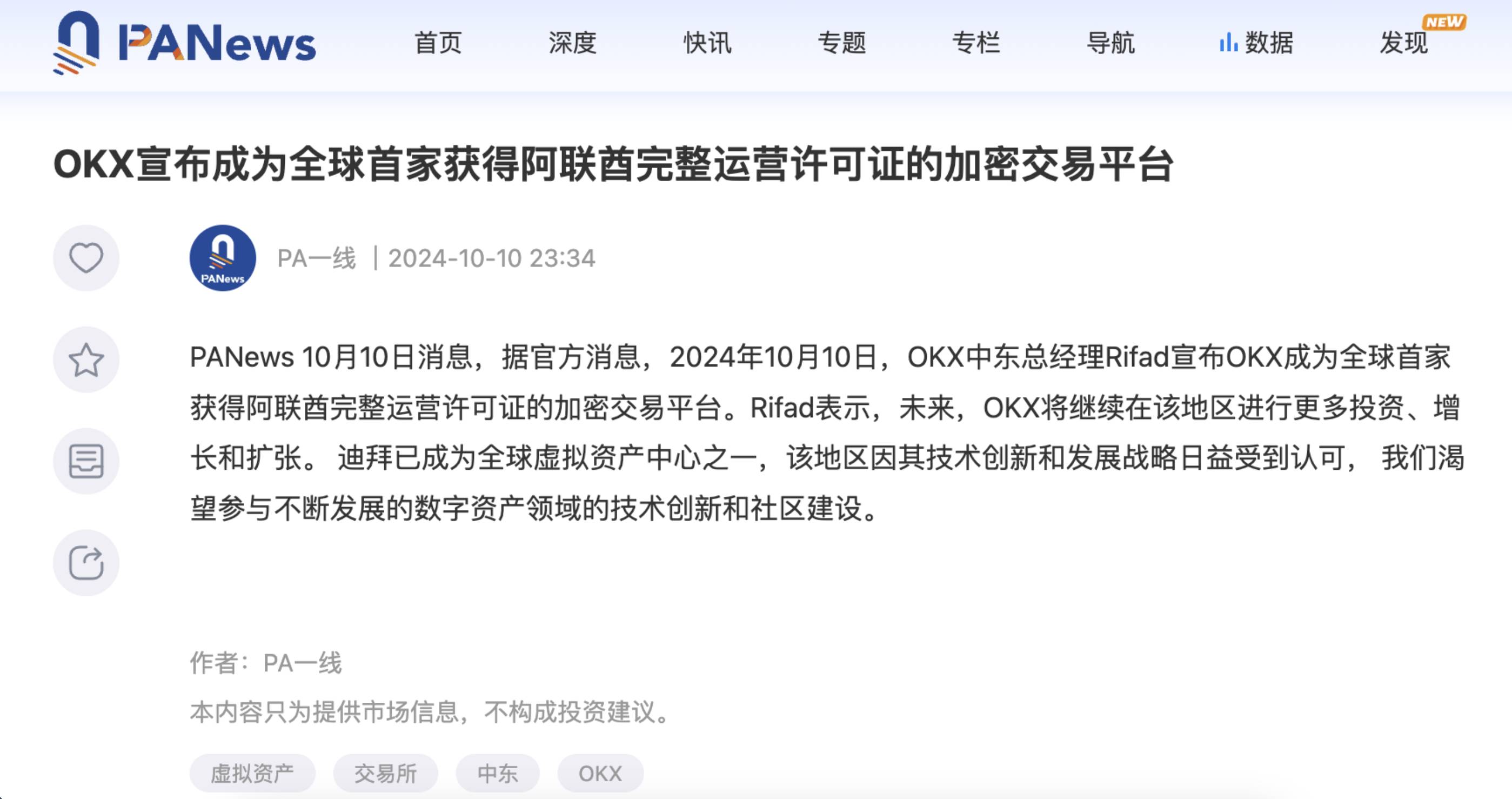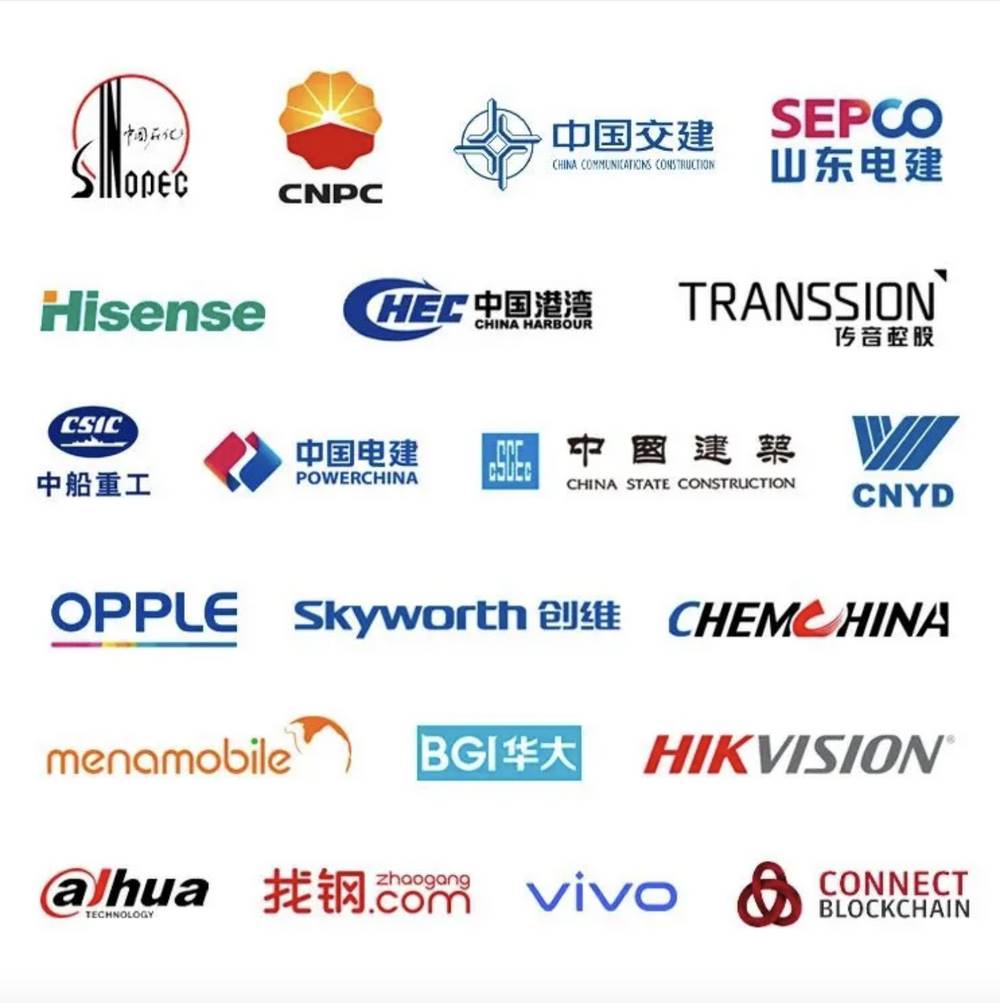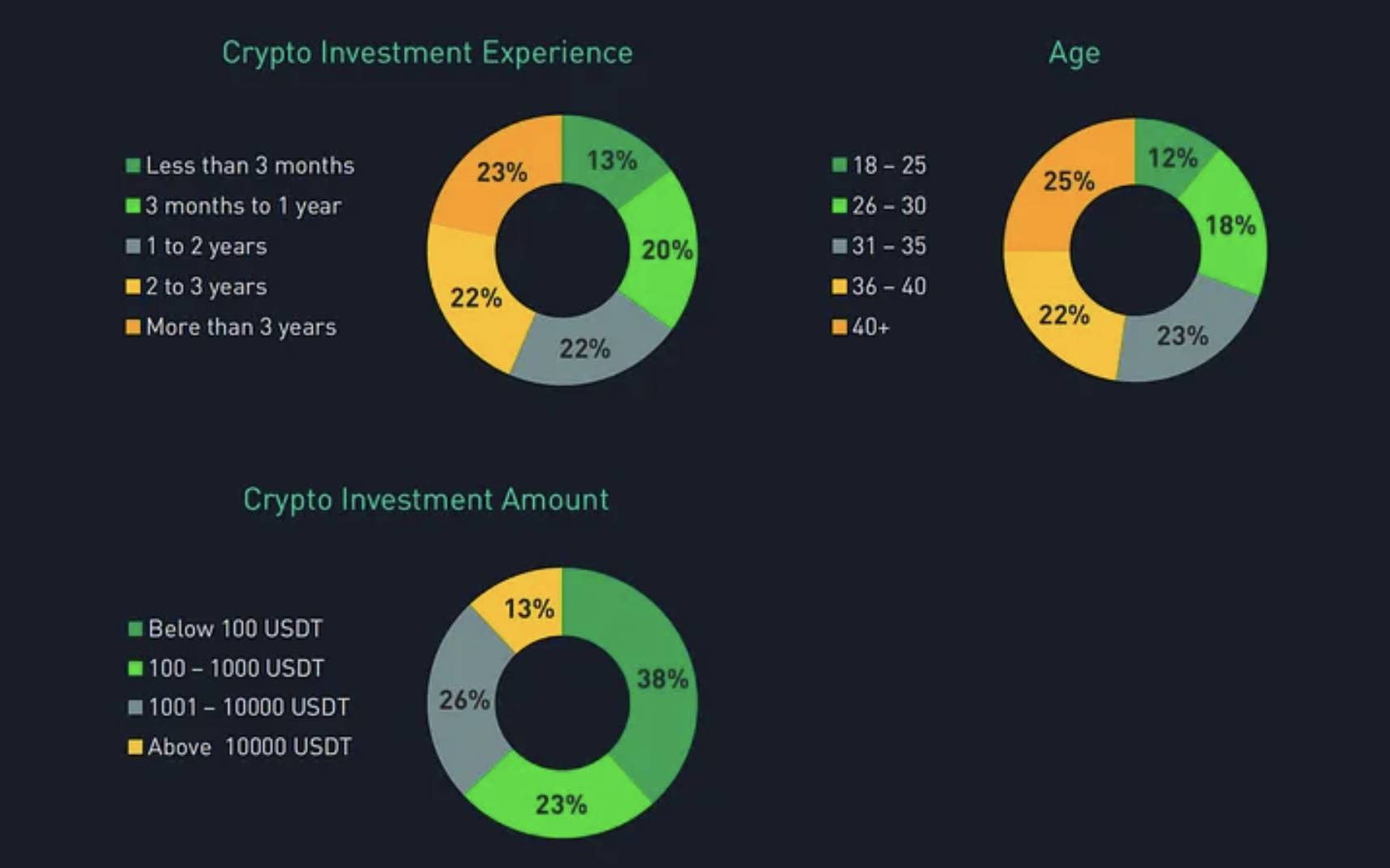Author: Jin Jianzhong, Manquin Law Firm
On October 10, OKX CEO Star Xu personally went to Dubai and announced to the whole network that OKX has become the first crypto trading platform to obtain a full operating license in the UAE. This news not only shows OKX's global compliance process, but also means that OKX can take the lead in expanding its business footprint in Dubai, the hot spot for Web3 startups, and seize the business opportunities in the UAE.

Coincidentally, during the Singapore TOKEN2049 event, Wu Blockchain interviewed Bybit CEO Ben Zhou. In the interview, Ben Zhou particularly mentioned that Bybit had set up its global headquarters in Dubai as early as 2023. More than a year has passed, and Bybit and Ben Zhou are still adamantly recommending Dubai to all Web3 entrepreneurs: "The feeling we get from Dubai or the entire UAE is that they see the crypto industry as an opportunity. They realize that oil may not last forever, and they want to attract more fintech and frontier technology. Therefore, from the government to various departments, they are very welcoming to us and provide substantial policy support. This is completely different from some other regions. Dubai not only provides support, but also offers convenient visa and other measures, making you feel welcome."
In fact, the Middle East region represented by Dubai has been a popular destination for Web3 projects to go overseas in the past two years, and Manquin Law Firm has often been asked by Web3 entrepreneurs about Dubai's crypto policies and company establishment channels. Previously, Manquin Law Firm wrote a special article "Crypto Oasis in the Desert: Overview of Dubai VASP Licenses and Application Guide", and this article will provide Web3 entrepreneurs with the first step guide to setting up a company in Dubai. However, before that, Manquin Law Firm will first review why Web3 is so optimistic about Dubai.
Dubai's Traditional Advantages
Currently, many well-known multinational companies such as P&G, Microsoft, Adidas, and Nestlé have set up their MENA (Middle East and Africa) regional headquarters in Dubai. Chinese companies, especially state-owned enterprises, also particularly like to go overseas and conduct business in Dubai. This is based on some "traditional advantages" of Dubai.

* Chinese companies that have set up companies in Dubai
Excellent Geographical Location
Dubai is located at the intersection of Europe, Asia and Africa, and can radiate the markets of the Middle East, Africa, South Asia and Europe.
The time zone of Dubai is Gulf Standard Time (GMT+4), which allows it to cover the business hours of the European, Asian and African markets at the same time: the time difference with Europe is about 3 to 4 hours, and the time difference with Asia is 1 to 4 hours. Dubai companies can easily coordinate business communication and transactions with Europe, Asia and Africa.
Favorable Tax Policies
Dubai has no personal income tax, payroll tax, capital gains tax, or inheritance tax.
For most companies, companies with profits exceeding 375,000 dirhams (about 700,000 RMB) need to pay a 9% corporate income tax, which is still relatively low compared to many global jurisdictions (for example, Hong Kong has a 16.5% corporate income tax, Singapore has a 17% corporate income tax), and those below the tax threshold have 0 tax returns. Companies registered in the free zone usually enjoy a 50-year or even longer corporate income tax exemption if their income is from the free zone or the international market; the value-added tax is 5%.
Free Foreign Exchange
In Dubai, the buying, holding and transfer of foreign exchange is free. Companies in Dubai can easily conduct cross-border transactions and use its open financial market for foreign exchange transactions, without complex approval procedures, and foreign investment and capital flows are very convenient.
For Web3 companies involved in the payment sector, Dubai's free foreign exchange provides an extremely free environment for their business development.
Free Profit Distribution
Dubai's corporate profit distribution policy is very flexible. Companies can freely decide to distribute profits to shareholders or reinvest them in the company, without any requirements for profits to remain in the company. At the same time, companies do not need to pay additional taxes when distributing profits to shareholders.
Friendly Passport and Visa Policies
Chinese citizens with a valid passport of more than 6 months can enter Dubai visa-free. At the same time, Dubai's visa policy is flexible and convenient, providing Chinese citizens with a variety of options, and it is also very convenient to apply for residence visas for children, parents, and spouses.
Dubai's Web3 Atmosphere
For Web3 entrepreneurs, Dubai's Web3 atmosphere, including a wide user base and crypto-friendly regulatory policies, is a key reason why they are willing to set up their companies there.
UAE's User Base
According to a report from the Bitget Research Institute on the Middle East, in February 2024, the number of users on centralized crypto exchanges in several Middle Eastern countries was roughly in the range of 100,000 to 150,000 DAU. It is worth noting that the population of the UAE and Morocco is about 1/3 of Saudi Arabia and Egypt, but they have reached a DAU on centralized crypto exchanges that is not much different from the gap. This reflects that the penetration and usage rate of centralized crypto exchanges in the UAE and Morocco are significantly higher than in Saudi Arabia and Egypt. Over the past year, the number of users in the UAE has increased by about 70%.
According to a survey by financial services company Holborn Assets, the interest of UAE users in using cryptocurrencies is increasing:

29% of users believe that cryptocurrencies are a more convenient way to hold assets, 34% of users are crypto traders, and 22% of users use them for daily payments. As an investment property, UAE users are most willing to invest in BTC and ETH, and BTC is called "digital gold" by UAE users, with 72% of users investing in BTC. In terms of interaction habits, UAE users are adept at using the trading and lending functions of DEXs and are familiar with on-chain operations.
In addition, UAE users are concerned about the latest developments in the crypto market and have a high degree of attention to projects such as RWA, metaverse, AI, and cross-chain bridges.
Dubai's Virtual Asset Regulation
The Dubai government has long been providing comprehensive and strong support to the blockchain and Web3 industry, through initiatives such as the Dubai Blockchain Strategy launched in 2016, the UAE Fourth Industrial Revolution Center established in 2019 by the Dubai Future Foundation and the World Economic Forum, and the Dubai Metaverse Strategy in 2022, laying a solid foundation for digital opportunities.
In terms of virtual asset regulation, Dubai has even dared to take the lead, setting up a separate regulatory agency VARA (Virtual Assets Regulatory Authority) to regulate and supervise the provision, use and exchange of virtual assets in Dubai. According to industry insiders, as VARA operates on a market-oriented standard, the regulatory framework is clear and explicit, the regulatory level is highly professional, and the regulatory attitude is approachable, and if needed, you can even have meetings and discussions with VARA officials at any time.
So how to set up a Web3 company in Dubai? First, you need to understand the company types in Dubai.
Dubai Business Locations and Company Types
When setting up a company in Dubai, you first need to decide where to conduct your business. In the UAE, business activities can be divided into two main categories: free zones and mainland, which have some differences in business operations, employee composition, office space, and visas.
Free Zones
Business Scope: Companies in the free zones mainly focus on commercial activities outside the UAE. Specific free zones in Dubai can issue dual licenses to companies, allowing them to engage in both domestic and overseas activities.
Employee Composition: Free zone companies are not required to employ UAE nationals.
Office space: There is no mandatory requirement for physical office space for enterprises in the free zone. If the enterprise chooses to lease office space, that space must be located within the free zone.
Visas: The free zone enterprises operate under a quota or restriction system. Companies can increase the number of visas they can obtain by relocating to a larger office or applying for an increase in the visa quota, but this must be approved by the free zone management authority before taking effect.
Mainland
Business scope: Mainland enterprises have no geographical restrictions on their business activities. Companies here can operate both within and outside the UAE, and are subject to Dubai's standard laws and regulations.
Workforce composition: Mainland enterprises are required to have at least 2% of their skilled workforce be UAE nationals.
Office space: Mainland enterprises must have a physical workspace of at least 100 square feet, but there are no restrictions on the location of the office space that the company leases or purchases.
Visas: Mainland enterprises can obtain an unlimited number of visas as long as the size of their operating premises and business activities meet the regulatory framework.
In general, non-UAE-based companies are more suitable for registration in the flexible free zones. There are 3 types of free zone companies:
Free Zone Limited Liability Company (FZ LLC), the most common business structure, suitable for medium and large enterprises with multiple shareholders.
Free Zone Company (FZ Co.), similar to FZ LLC, usually suitable for companies wishing to conduct business in a specific free zone.
Free Zone Establishment (FZE), a single-owner business structure, suitable for entrepreneurs and small companies who want to have sole control of the business.
Dubai Company Setup Process
Determine the business activity
When starting a business, the first step is to determine the nature of the business. In Dubai, there are over 2,100 business activities to choose from, spanning the industrial, commercial, professional and tourism sectors.
Choose a free zone
Dubai has over 30 free zones to choose from, and it is often wiser to set up near companies in the same industry.
Choose a company name
When choosing a business name, it is important to ensure that it complies with UAE naming conventions. Names containing offensive language may be considered blasphemous. References to political groups or the mafia are prohibited. If the company is named after an individual, proof must be provided that the person is a partner or owner (initials or abbreviations are not allowed).
Apply for preliminary approval
The Dubai Department of Economic Development (DED) requires preliminary approval to ensure there are no objections before starting the business. The documents required will depend on the nature of the business, but typically include:
Business registration and licensing application form
Copies of passports or ID cards
Copies of residence permits / visas
Memorandum of Association
Feasibility study for the project
Open a corporate bank account
Once approved and in possession of all necessary documents, a corporate bank account can be opened.
Set up the office location
All businesses in Dubai must have a physical address.
Apply for final approval
You will need to prepare all documents, address and legal information to submit for final approval.
Provided all materials are in order and there are no official objections, the company registration can typically be completed within 1 week.
Conclusion by Mankun Lawyers
Whether it's the traditional geographical and tax advantages, or the extremely Web3-friendly attitude, Dubai is gradually becoming one of the top global destinations for crypto startups. According to the "World's Most Crypto Business Friendly Countries in 2024" report published by Social Capital Markets, Dubai ranks #1 globally, beating out Switzerland, Japan/South Korea, Singapore, the US and other "traditional" hotspots.
With OKX's recent announcement of obtaining a full crypto exchange operating license, Dubai has been further cemented as a key strategic location in the global crypto business landscape. It is believed that more well-known Web3 companies and startups will seek to establish a presence in Dubai, and company setup will be a prerequisite in this process.







